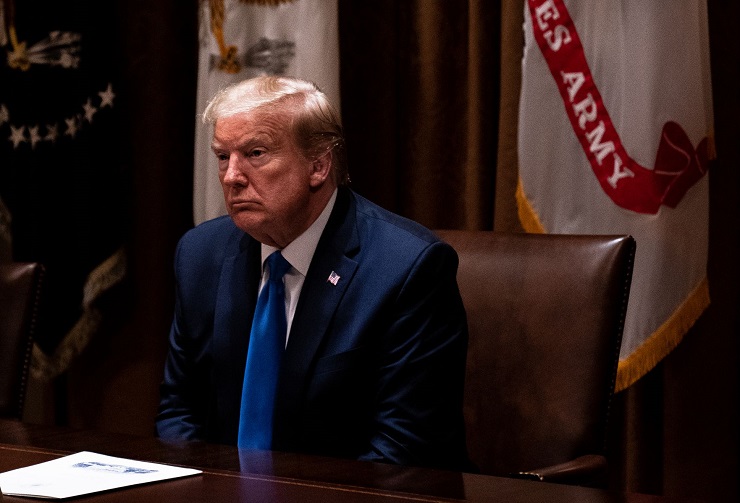While the actual arena of electoral politics is always domestic, the US has a different case where international geo-politics, too, plays a significant role to the extent that a reference to what a given president/administration is doing or has done overseas to deal with the threats to the US national security becomes the most important point of electoral debate. While this may just simply seem to be the case of how foreign policy impacts domestic politics, threatening to start a war with an avowed enemy just before elections becomes more of a part of electoral politics than just an issue of foreign policy. Indeed, the Trump administration’s decision to unilaterally impose sanctions on Iran, projecting them as ‘UN sanctions’, and its re-deployment of warships in the Persian Gulf indicate how this issue will become a hot topic of political debate at a time when elections are just few weeks away. There is no gainsaying that Trump, in order to boost his political position, may even start a limited war.
On September 18, the US announced that USS Nimitz passed through the Strait of Hormuz with the guided-missile cruisers USS Princeton and USS Philippine Sea and guided-missile destroyer USS Sterett. The statement also said that “The [Carrier Strike Group] will operate [in the Persian Gulf region] and train alongside regional and coalition partners, and provide naval aviation support to Operation Inherent Resolve [in Iraq and Syria].”
This incident, reported widely across the media in Iran as well, comes as a part of the US decision to impose arm embargoes on Iran. The US obviously does not want to just have sanctions on paper; it wants to enforce them them as well, and enforcement would possibly entail US warships attacking and confiscating Iranian cargo ships in international waters — as well as non-Iranian vessels suspected of carrying Iranian good; hence, the most recent deployment.
Indeed, the US has already taken similar actions off the coast of Venezuela where the former seized Iranian vessels. While these vessels were seized in Latin America and did not invite a direct Iranian response, such seizing in the Persian Gulf—particularly in the strait of Hormuz—would possibly invite a direct reaction from Iran (the way Iran responded to the killing of General Soleimani).
While the deployment of US warships can be seen as a part of enforcement mechanism, it also indicates a concerted US effort to virtually impose a naval blockade of Iran, threatening oil shipments as well. It is, therefore, not just a coincidence that a strike group is being deployed in the Persian Gulf after a gap of ten months, during which US-Iran tensions remained high as usual, when the Trump administration wants to enforce the sanctions, create tensions and thus generate a scenario that it can use for political gains.
However, while this appears to the be the scenario that the Trump administration seems to be building, there are strong chances that it can backfire in a significant way, or that it may not work at all.
First of all, given Iran’s substantial missile strike capability, it can inflict serious damage to the US, a scenario that might very well accelerate Trump’s decline at a time when elections are only two months ahead.
Secondly, Iran, sensing the trap here and realizing that a war with the US at this stage will add to Trump’s political position, may very well decide against retaliation and exercise restraint. A restraining Iran will make Trump the aggressor and create political difficulties for him as well.
As such, while Iran has threatened retaliation, it has also toned-down itself. This is particularly evident from the fact that it took no retaliatory step for what has been called and widely reported in the international/US media as an ‘Israeli attack’ on Iran’s nuclear enrichment facility in Natanz.
Exercising restraint appears to be a calculated move given that the Iranian policy makers understand that a Biden presidency will be more amenable than the Trump administration. For instance, Biden’s foreign policy advisor Anthony Blinken recently told CBS News:
“We disagree fundamentally with the approach the administration took on Iran… If Iran comes back into compliance with the deal, then yes, Joe Biden said we would do the same thing, but we would use that as a platform to try to build a stronger and longer deal working with our partners.”
Iran, therefore, has strong reasons to thwart US plans to ignite tensions in the Persian Gulf. However, it may not have any option but to militarily retaliate if the Trump administration, facing a weak political position, imposes a war just as it has imposed sanctions with UN approval.
In other words, while Iran itself may not take an aggressive step in the Gulf, such as attacking the US warships, the US can always manufacture incidents to justify its own offensive. As such, while a war in the Gulf would entail an extremely high risk, the Trump administration, surrounded by hawks as it is, might be willing to take the risk to secure four more years in the White House.
Salman Rafi Sheikh, research-analyst of International Relations and Pakistan’s foreign and domestic affairs, exclusively for the online magazine “New Eastern Outlook”.

